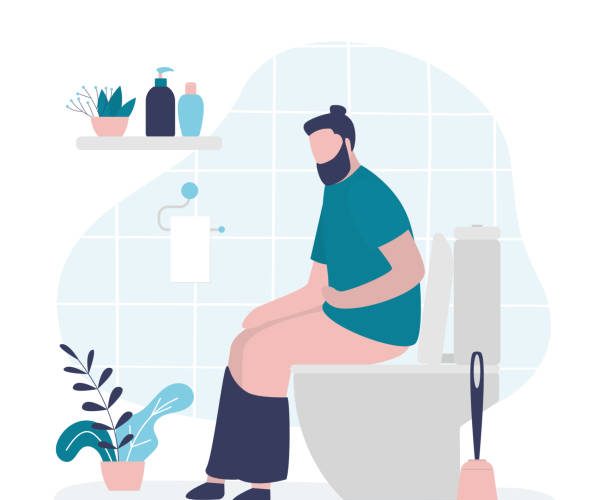Some might think it’s crazy to know that pooping regularly contributes to weight loss.
Seeing how much information is quick to go around nowadays, you may have heard or seen somewhere that you can lose reasonable weight through pooping. You’ve probably wondered how possible it is to lose weight after pooping, knowing that there aren’t noticeable changes in body size.
So, lets look at how much weight you can truly lose by pooping.
The amount of weight loss varies from person to person. A large amount of poop weighs about 100 grams. This can vary based on a person’s physical condition and how often they use the restroom. Typically, feces consist of about 75% water, so going to the bathroom removes a little bit of water weight from the body contributing to slight weight loss.
This article explains how much weight one can lose when pooping and if pooping helps someone lose weight.
Also, we share how much poop weighs in the body and different ways to empty one’s bowel to encourage this weight loss.
How Much Weight Do You Lose When You Poop?
According to certain researchers, an average person loses about 2-3 calories per bowel action. However, the number of calories burned is likely much lower, as the body system expends very little energy during this process.
When a person poops, they get rid of the food in their stomach, which is why they feel lighter after using the restroom. In this case, the person loses a modest amount of weight.
Measure your body before and after taking a stool to confirm the validity of these claims. For example, you might notice a slight drop in your weight after taking a stool.
Pooping is an act that requires pressure on the muscles. In this case, fats can burn more than 65 calories per hour.
Although less fat is burned, it is less painful. This type of pooping is also the healthiest kind. Several factors determine how an individual burns calories differently. Pooping alone cannot be viewed as an exercise that could make one lose weight and fat.
Rather than concentrating on your weight or size, it’s best to pay attention to the appearance of your excretion.
It’ll tell you a lot about your health, like if you’re consuming adequate fiber, drinking enough water, or if there’s an underlying issue. That being said, how frequently or how not you use the bathroom can influence your weight, and staying stable is crucial to your staying well.
Does Pooping Help You Lose Weight?
The body absorbs everything helpful, and the rest is wasted. For example, when a person has a bowel movement and then weighs themselves, they may see a slight weight change that tends to be equal to the weight of the stool. However, if the difference is visible, it is barely noticeable and does not result in long-term weight loss.
As the body passes poo, it also releases gas. This reduces bloating and makes individuals feel like they have lost a small amount of weight. However, it is crucial to remember that many factors affect weight. It is not simply a measurement of what runs in and out of the body system. The weight loss that comes with having a bowel movement is brief.
While you might feel lighter after pooping, you won’t lose much weight. What’s more, when you lose weight while pooping, you’re not getting rid of the weight that matters. So it would help to burn more calories than you eat to eliminate disease-causing body fat.
Our body constantly burns calories to carry out essential daily routines, including breathing, eating, regulating body temperature, and performing passive activities such as reading. For example, while using a bathroom, your body continues to burn calories as you sit on the toilet.
Your sitting position when using the toilet also matters. After all, you could burn more or fewer calories depending on how you sit. Losing weight can sometimes be essential for the human body, mainly if you are fat, but you should not lose weight through pooping.
We sure feel lighter after stooling, but such bowel movements do nothing to lose most fats in the stomach region. To shed weight properly, you should change your meals and eat more decadent fiber foods while exercising daily. Pooping does help to lose weight as it eliminates the nutrition our body system didn’t digest.
A person is likely to stool twice to three times a day, as the more they excrete, the lighter their bowel area feels. However, this does not significantly affect body fat levels.
How Many Pounds Does Poop Weigh in The Body?
Normal excretion weighs around 1/4 to 1 pound, depending on the individual. Fat individuals who eat and drink more or have less-regular bowel tendencies have solid pooping.
It takes 33 hours for food to be processed into feces and passed out of your body.
The weight of your poop comes from the content of the water, fiber, and bacteria present in the excretion. Water makes up about 75% of feces, and stool weight increases when more fiber is eaten because thread contains a ton of water.
An adult man weighs 195.7 pounds, and an adult woman weighs 168.5 pounds. This means a man of moderate weight produces roughly 1 pound of feces. A woman of average weight has about 14 ounces of feces daily in her large intestine.
The colon is where fluids and salts are absorbed from the cecum to the rectum. The final part of the large intestine is the rectum, where feces is stored before leaving the body through the anus.
The primary job of the large intestine is to extract water and salts from undigested material and to form solid waste that can be excreted.
Bacteria in the considerable intestine help break down unprocessed materials. The remaining contents of the large intestine are moved toward the rectum, where excrement is stored until they leave the body through the anus as a bowel movement.
Do You Poop More When on a Weight-loss Diet?
Healthy weight loss diets typically include many fruits, vegetables, and whole grains. In addition, they are rich in fiber. Including more fiber in the diet can heighten stool weight and encourage regular bowel movements. Due to this, a person following a weight loss diet may use the toilet regularly.
If you recently started eating more fruits, vegetables, and whole grains, you may need to excrete more often. This is because these foods are high in fiber, which aids in blood sugar control, prevents heart disease, and promotes colon health. The side effect, however, is that you will use the toilet more often.
To keep it simple, as your body burns up surplus fat to create energy after joining a weight loss program, you breathe it out as carbon dioxide or discharge it with sweat, urine, tears, and feces.
Putting aside that healthy weight loss typically includes fruits and vegetables. These foods are all rich in fiber. Including more fiber in the diet or meal plan can boost stool weight and encourage regular bowel tendencies.
Because of this, a person following a weight loss diet may use the bathroom more than usual. Regardless, it is crucial to recognize that any weight loss they see is primarily due to other parts of the diet. For example, numerous weight loss diets recommend eating more protein. Meat is a definitive source of protein, but it can be more challenging to ingest than other foods.
Also, these meal plans may not have enough nutrients for the human body. In the absence of fiber, excreta may be loose and watery. Inadequate consumption of fiber can also cause constipation.
Weight loss diets high in fiber may heighten bowel tendencies when opting for a vegetarian diet. However, weight loss diets not rich in fiber may decrease bowel movements.
A balanced diet should include fruits, vegetables, whole grains, lean meat, fish, eggs, beans, and nuts. In addition, it should restrict saturated fats, processed foods, and high amounts of salt and sugar. Consuming only as many calories per day as the body needs and working out daily are practical methods to maintain a healthy weight.
An accurate weight measurement can also be beneficial when following a weight-loss diet.
Note, however, that losing weight through pooping can be a good and bad thing silmutaneously. So unless you are under professional watch, se a doctor if you are losing noticeable weight through stooling.
What are the Ways to Empty Your Bowels?
Your bowels consist of your lower digestive tract and consist of your intestines, rectum, and anus. Your rectum is where stools (feces) accumulate. Your brain sends messages to your rectum when it is complete and needs to be unloaded. The diverse ways to empty one’s bowels are as follows:
Load up on Foods Containing Fiber
Fiber-rich foods with high water content, like raw carrots, apples with the skin or peel on, and avocados, are all great sources of fiber to help with excretion.
When eaten, these foods create an osmotic gradient. That means they force more water into the colon during digestion, which aids and prevents constipation by helping things flow freely.
Take a Fiber Supplement
Look for a daily supplemental dose of 5 to 8 grams of fiber, available over the counter. Just remember: consuming a nutritious diet that should naturally contain some raw fiber found in food is vital, even if you decide to take a fiber supplement.
You must do more than just add a handful of fiber supplements to your bottle of Pepsi if you expect your digestive system to work adequately.
Drink Hot Tea or Coffee
This is often the first thought that comes to mind when faced with the issue or problem of how to make myself poop. Warm beverages, especially hot coffee or tea in the morning, can help with bowel movements.
But coffee, in particular, is a must for anyone that wants to poop immediately. The heat from the coffee can stimulate movement, but the coffee itself is also known to stimulate colon motility.
Coffee can be served hot or chilled. But other cold caffeinated drinks or liquids like iced tea won’t have the same effect or impact.
Exercise Regularly
Have you ever been in a situation where you needed a bathroom immediately? You’re not alone. Also note that hiking, walking on uneven grounds or in a park, running, and biking can help increase bowel tendencies.
Squat When you Use the Toilet
you can achieve the squatting position by placing a stool under your feet and raising your knees. Squatting improves anatomy by relaxing the muscles in that area while also heightening the part of your colon that makes for easy unloading of the bowel. Also, the tighter the squads, the easier it will be to excrete.
Apply Massages on your Abdomen
Using appropriate pressure and massaging your abdomen clockwise can help with excretion. In addition, colonic massage has been known to improve constipation.
You can achieve this by using mild pressure along the horseshoe shape of the colon in your right lower quadrant.
Then continue advancing up to the rib cage, across the stomach, and beneath the ribs to your left lower quadrant, which is the point where stool is unloaded.
Drink Enough Water to Stay Hydrated.
One of the most common causes of constipation is dehydration. When poorly hydrated, the body will counteract by taking water from the large intestine (colon), resulting in thick stools.
An interesting rule of thumb is to drink 30ml of water for every 1 kilo of your body weight.
Conclusion
In conclusion, the body’s system is constantly digesting food and discarding waste, causing weight fluctuations. Therefore, weight losses after using the toilet are most likely short-term.
It’s necessary to poop often to maintain overall health, but it’s not an effective way to lose weight. However, eating fiber-rich foods and exercising can promote weight loss and regular bowel movements.
Reference Links








